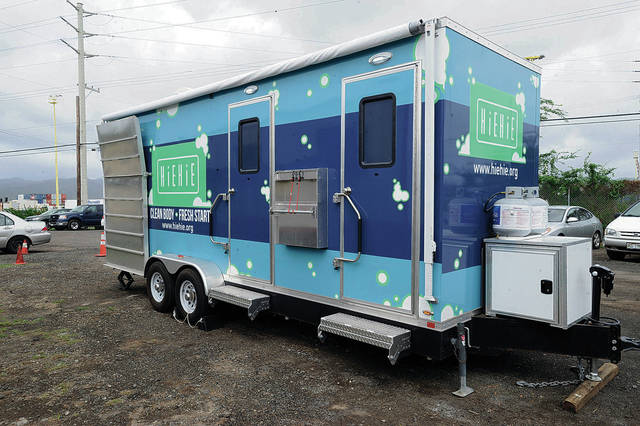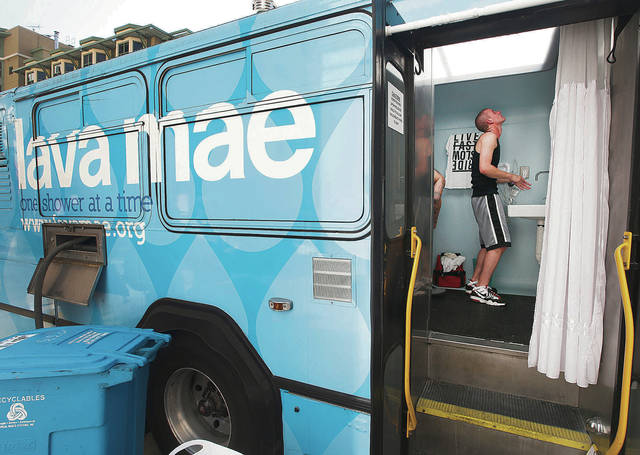Oahu’s first mobile homeless hygiene center hits the road

BRUCE ASATO / BASATO@STARADVERTISER.COM
The Hiehie mobile hygiene center was parked in the driveway of the Institute for Human Services’ Hale Mauliola shelter at Sand Island on Tuesday. The hygiene center consists of two regular shower and restroom stalls and an ADA-compliant shower and restroom stall, with the ability to provide up to 20 showers per day.

TONY AVELAR / SPECIAL TO THE STAR-ADVERTISER
The Hiehie trailer was modeled after California’s Lava Mae buses, above, one of which was parked in the Tenderloin District in San Francisco.


A nonprofit group has imported a 26-foot trailer equipped with bathrooms and toilets and is already towing it around Oahu to provide homeless people a place to get clean — and perhaps lead them off the streets.
The “Hiehie” hygiene trailer provided hot showers and the use of its toilets to nine people in Wahiawa on Saturday and a dozen more in Kailua on Tuesday morning, said Annie Valentin, executive director of Project Vision Hawaii.
In Kailua, Valentin said, “People were lined up before we even opened.”
| VIEW HIEHIE
To request a visit from the Hiehie hygiene trailer project, contact Project Vision Hawaii by emailing hiehie@projectvisionhawaii.org or by calling 201-3937 (201-EYES). |
Project Vision Hawaii and its partners are scheduled to formally unveil Oahu’s first mobile hygiene unit for the homeless this morning at the city’s Hale Mauliola transitional shelter on Sand Island.
Don't miss out on what's happening!
Stay in touch with breaking news, as it happens, conveniently in your email inbox. It's FREE!
“‘Hiehie’ means ‘dignity,’ ‘distinguished,’ like the word you would use for the queen,” Valentin said of the name, which is of Hawaiian origin. “We want to revive the dignity that is already in people. We’re super excited.”
The trailer was built for Project Vision Hawaii on the mainland. It’s outfitted with three stalls that have their own showers and toilets. One complies with Americans with Disabilities Act requirements and includes a diaper changing table.
Water comes from any hose and is heated with propane, similar to a backyard barbecue. The trailer is designed to accommodate waste water from 20 users before it has to be dumped in a treatment plant, Valentin said.
“Two or three” workers will staff the trailer and provide donated towels and toiletries. The workers will be paid out of the program’s funds, Valentin said.
The Hiehie trailer is modeled after California’s nonprofit “Lava Mae” buses Opens in a new tab that help keep streets clear of human feces and urine while giving the homeless a sense of dignity, organizers, tourists and homeless clients told the Honolulu Star-Advertiser in 2015 in San Francisco’s Tenderloin District, before the program expanded to Los Angeles.
The name is a play on the Spanish verb “lavar,” or “to wash.”
Last year, city officials tried to replicate the Lava Mae idea on Oahu Opens in a new tab by trying to offer a contract to a nonprofit organization that would convert two obsolete Honolulu city buses into Hawaii’s first “mobile hygiene centers.”
But the cost of retrofitting and maintaining old, 40-foot buses, which require a licensed commercial driver to operate, proved too complicated and costly.
So the city is now working on a scaled-down, portable hygiene trailer project similar to the one Project Vision Hawaii plans to show off today.
“Our effort is going to take a few more months,” city spokesman Andrew Pereira told the Star-Advertiser in an email Tuesday. He estimated that the city-backed truck and trailer will arrive in 2-1/2 months.
In the meantime, Project Vision Hawaii formed its own hui of donors and partners including the Zilber Family Foundation, Aloha United Way, Hawaii Cares, Navatek, Hawaii Women’s Legal Foundation and Matson for its $150,000 Hiehie mobile hygiene center, which is towed behind a used GMC F350 truck that was purchased on Oahu.
“It’s more cost effective to use the trailer,” Valentin said. “If you can haul a boat, you can haul this trailer. You don’t need a special license.”
The idea is to provide 6,000 showers a year across Oahu while partnering with social service agencies at different locations to offer a range of homeless services, including permanent housing.
“That’s the goal,” Valentin said. “That is the end goal, housing.”
This week, the trailer is scheduled to remain at Hale Mauliola. Then organizers expect to partner with social service agencies and communities around Oahu to select different spots.
Valentin hopes that the Hiehie showers offer a “gateway” to lead homeless people to accept additional help.
In the meantime, Valentin expects that hot showers and the use of a toilet will provide Oahu’s homeless with a greater sense of dignity.
“We’re just trying to provide a basic human need,” she said. “I know I’m a better person after a hot shower.”




